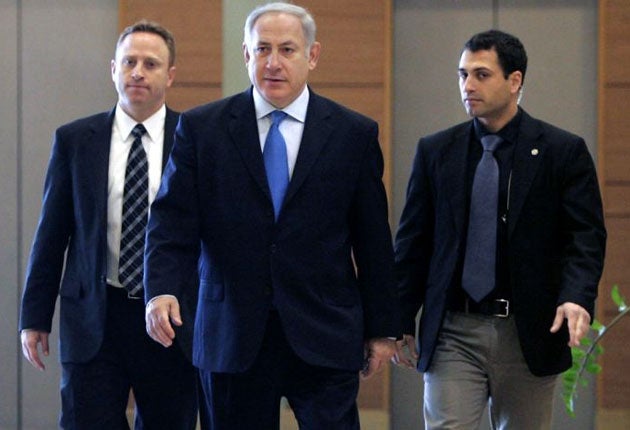Netanyahu draws Labour party into Israeli coalition deal
Barak says he will be leading partner and peace process will continue

Your support helps us to tell the story
From reproductive rights to climate change to Big Tech, The Independent is on the ground when the story is developing. Whether it's investigating the financials of Elon Musk's pro-Trump PAC or producing our latest documentary, 'The A Word', which shines a light on the American women fighting for reproductive rights, we know how important it is to parse out the facts from the messaging.
At such a critical moment in US history, we need reporters on the ground. Your donation allows us to keep sending journalists to speak to both sides of the story.
The Independent is trusted by Americans across the entire political spectrum. And unlike many other quality news outlets, we choose not to lock Americans out of our reporting and analysis with paywalls. We believe quality journalism should be available to everyone, paid for by those who can afford it.
Your support makes all the difference.Ehud Barak, Israel's Defence Minister, last night managed to persuade his deeply divided Labour Party to enter a coalition government led by Benjamin Netanyahu in a move likely to send shock waves through the Israeli left. Mr Barak won the day by a decisive if relatively narrow margin of 680 votes to 507 at an emotional meeting of Labour's central committee after earlier sewing up a draft coalition agreement with Mr Netanyahu, leader of the biggest party on the right.
The move was widely depicted in Israel as assisting Mr Netanyahu in what he is said to regard as the crucial task of minimising the friction with Washington which helped lead to the downfall of the narrow right-wing government he led from 1996 to 1999.
But it also casts further doubt on a future role as the main centre-left party for Labour, which dominated much of Israel's history since the beginning of the state 60 years ago but slumped to fourth place in this February's election.
In an especially anguished speech from the losing side in yesterday's debate, Ophir Pines-Paz, a prominent Knesset member on Labour's left, referred to three previous Labour prime ministers declaring: "[Yitzhak] Rabin, Golda [Meir] and [Moshe] Sharett are turning over in their graves. We were given a chance to continue their path. Mr Barak did not get a mandate for throwing Labour on the scrapheap of history."
But Mr Barak strongly commended to delegates the deal under which Mr Netanyahu, who has hitherto never declared himself in favour of a Palestinian state, has agreed to work for regional peace and to honour previous "diplomatic and international" agreements reached by Israel.
Tzipi Livni, Israel's current Foreign Minister, has so far consistently rejected Mr Netanyahu's overtures aimed at bringing her Kadima Party into his coalition on the grounds of his refusal to commit himself to the two state solution. But Labour proponents of the deal will argue that the new formula commits Mr Netanyahu to the 16-year-old Oslo accords which he opposed during the 1990s, and which envisage "final status" negotiations with the Palestinians.
In what was arguably the most testing and dramatic internal party speech of his career, Mr Barak moved to reassure delegates that he would be the leading partner in the new coalition. "I am not afraid of Bibi Netanyahu," he declared. "I will not be anyone's fig leaf ... we will be a counter-weight that will ensure we do not have a narrow right-wing government."
Mr Barak rejected the argument of his opponents that Labour should now rebuild itself in opposition, pointing out that Kadima would in such circumstances be the leading party outside the government.
The deal reached between Mr Barak and Mr Netanyahu – who has consistently said he wanted the Labour leader as his defence minister – also provides for hundreds of millions of shekels in retraining and manpower programmes designed to protect workers against the world recession. It was strongly promoted by a key Labour Party figure, Ofer Eini, the chairman of the Histradrut, Israel's TUC, who declared after yesterday's meeting in Tel Aviv: "I'm happy that party delegates have decided to enter the government."
Earlier Mr Barak sought to rally the deeply restive kibbutzim sector of the party, once its ideological and organisational backbone, by telling its representatives: "Life is not a movie, nor is it a reality show. We must ask ourselves what is right for the country and what is right for the party, and for us."
Mr Barak, who oversaw the recent military offensive in Gaza also declared: "Should the party join the coalition we will ensure that we don't miss diplomatic opportunities and that we don't get dragged into irreversible military adventures."
Video: Barak brings Labour into government coalition - From France 24
A Netanyahu government: the story so far
Things could change, but so far the Likud leader has reached deals with:
*Ehud Barak, Defence Minister, Labour leader and the man who succeeded Mr Netanyahu as prime minister in 1999. Mr Barak will stay at the defence ministry.
*Avigdor Lieberman, hard-right nationalist leader of Yisrael Beiteinu, expects to be foreign minister. Although Mr Lieberman has said he could envisage a Palestinian state in the right circumstances, he wants the "static transfer" of tens of thousands of Israeli Arabs to such a state.
*Eli Yishai, leader of the Sephardic ultra-orthodox party Shas, which has steadily moved to the right in recent years. Expects to be interior minister and Deputy Prime Minister. Also wants millions of shekels for religious colleges and child allowances tailor-made for large ultra-orthodox families.
Join our commenting forum
Join thought-provoking conversations, follow other Independent readers and see their replies
Comments